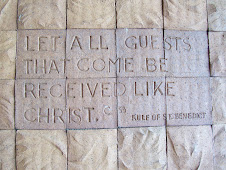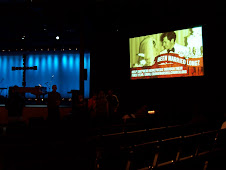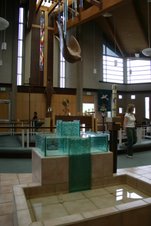Reflections on Mars Hill Church, Seattle, Washington
For pix, click here: http://picasaweb.google.com/fritzwiese/2007MarsHillChurchSeattle
What’s Captivating about the Ministry at Mars Hill Church . . .
They’ve grown from a weekly bible study the pastor lead in his home in the mid 1990s to a worshipping community of about 6,000/weekly today.
Their lead pastor, Mark Driscoll, has written two books that I read and enjoyed thoroughly. They are inspiring, honest, and insightful about both theology/missiology and the nuts and bolts of doing church in an uninterested 21st century urban America. He’s a funny, witty, and irreverent writer. Confessions of Reformissionary Rev and The Radical Reformission. I love the combination of humor, realism, and love for Jesus and his church. I don’t agree with his whole approach, but he’s a blessing to the church.
Seattle has been called the most “unchurched” city in America. In the last census, it was the first time “None” was the most frequent reply when asked to list “religious preference,” (as opposed to Christian, Jewish, Muslim, etc). Yet Mars Hill effectively connects with citizens who are highly irreligious.
A strong expectation of members. Mars Hill worship services usually are comprised of only 40% of members. The rest are visitors. If you want to be a member, you’re required to take an 8 session Gospel Class. At the end, you must sign a covenant that you’ll be in a small group, that you’ll give well to the church, and that you’ll worship and attend bible studies regularly. Many people don’t sign the covenant and leave the church; but Mars Hill is comfortable with that. They don’t want to foster a consumerism Christianity. They make clear that the expectations Jesus has for disciples are high—and in that expectation and commitment to discipline, joy is found.
Services that include weekly communion and child participation. Just as with my visit to Abiding Hope Lutheran, I found services that make sure children are included. While for the first 55 minutes of the service children go to “kids church,” when it’s time for communion, parents retrieve their kids so they may commune as a family and sing the final songs together. Again, they must know that the #1 faith formation factor for children is to worship with and alonside their parents—not just make it to a Sunday School experience.
A freedom to be culturally liberal and biblically conservative. What does this mean? Mars Hill realizes they can’t do it all. So they fully and exclusively embrace the music of today, with contemporary worship being lead by leading musicians in the Seattle club culture (most volunteers). (Classical Christian hymns are sung, but lead by a rock band.) Embracing beer, tattoos, a variety of hair styles, cinema, the internet and blogs, and outdoor recreation as marks and tools of today’s culture, and using them for ministry. Like Jesus, a proactive desire to hang out with “sinners,” to walk through Samaria, and deal with the very real questions and quandaries that today’s people have about faith (instead of maintaining an exclusively “proper and respectable” church culture. But while they are socially liberal, Mars Hill is biblically conservative and takes very seriously the biblical gospel of justified by grace through faith, calls to repentance and growth in discipleship, for good works for neighbor out in the world.
A realization that ministry is done both with attraction (top notch worship, a plethora of community small groups, bible studies that answer real questions—things people can come to) AND mission (getting every disciple fired up about reaching out to their friends and neighbors about the kingdom of God—going ‘out’ and ‘to.’) Mars Hill says that most attendees are missionaries before they are believers. They are inviting their friends to check out what’s going on at church or in small groups BEFORE they fully understand their theological stance or have made a formal commitment to Jesus. For them, evangelism is a lifestyle and not just an outreach program.
A commitment that mission growth needed a multi-site campus strategy. Mars Hill now supports 3 campuses, with plans for 3 more in the next 18 months.
A leadership development process where visitors can grow into members, and members can then take the next step of becoming a deacon, with special leadership responsibilities in the church. There is an attitude of service-leadership fostered. For those deacons who want to then become elders, they are required to serve a 12 month unpaid full time internship, before consideration by the other elders.
A realization that discipleship today requires a three-fold balance.
a. Those who love the gospel and culture, but don’t commit to church life is the parachurch. Maybe groups like Young Life are great for the moment, but unless they take the larger church seriously, they connect the culture to Jesus without connecting them to the rest of Jesus’ people. After college, they have no connection and float in isolation. This can lead to theological immaturity, with saved people encouraged to do little more than get other people saved. (Driscoll, The Radical Reformission, 21)
b. Church + Culture - Gospel = Liberalism. Some churches (and we mainliners are probably very guilty) convert folks to loving people and doing good works, but perhaps we don’t help people repent and develop a personal, growing relationship experience with Jesus. A full discipleship transformation isn’t taken seriously. But with Martin Luther’s strong track record, I think we’ve got a great corrective model.
c. Church + Gospel – Culture = Fundamentalism. Many Christians love the Bible, but hold culture in disdain. They’re waiting for the culture to come to them. They get inwardly focused in tradition, and replace the gospel love toward others with rigid morality, superiority and simple proof-texting of Scripture.
d. Mars Hill outlines a path striving to hold gospel, culture, and church in faithful tension with each other. From their recent history, it sounds like they’re doing a great job.
* Worship, interviews, and reading of Mars Hills books all served as great inspiration for analyzing Epiphany’s current crossroads on multi-site ministry and a desire for a more robust program for discipleship development. I’m continuing to read, reflect, pray, and organize the taped interviews I conducted for our fall retreats with leadership teams.
Sunday, August 5, 2007
Subscribe to:
Post Comments (Atom)



















No comments:
Post a Comment